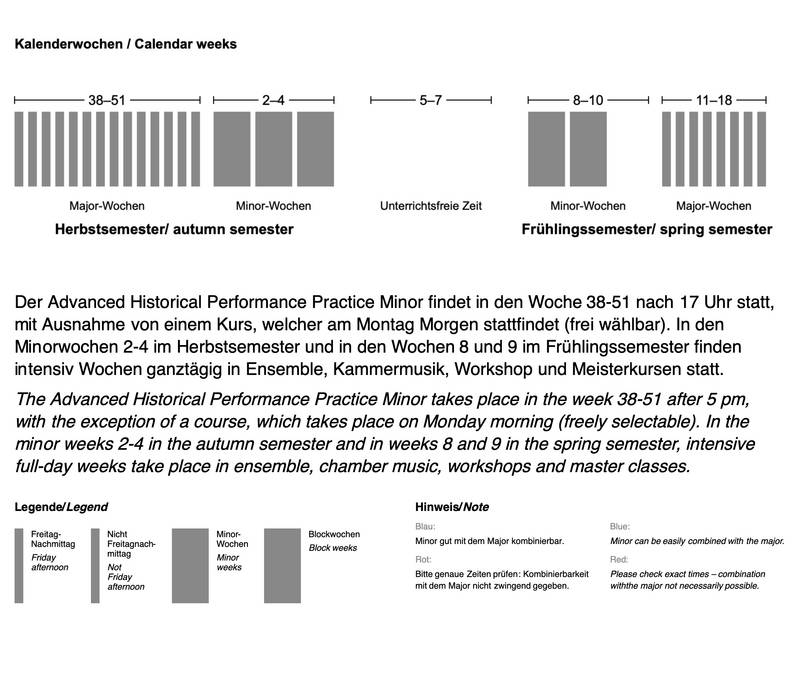Advanced Historical Performance Practice
Deepen your well-founded practical experience in the interpretation of historical repertoire on historical instruments and plan projects independently.
Study level
BA and MA
Coursework
15 credits
Teaching language
German / English
Start of studies
Every autumn and spring semester
Number of study places
Not limited
Course times
See time structure
Programme
Course content.
Students with comprehensive practical experience in the interpretation of historical repertoire on historical instruments or in singing are given the opportunity to specialize in the Minor “Advanced Historical Performance Practice”. In addition to external projects and public performances at ZHdK or its partners, the advanced programme offers courses in ensemble playing, improvisation, ornamentation, composition theory as well as individual tuition in instrumental or vocal subjects.
The minor in German and English is offered by the profile Interpretation & Performance. It is aimed at the Bachelor’s and Master’s degree levels.
Skills acquired in the course.
Graduates are able to work professionally in ensembles with historical instruments. In-depth knowledge of the specific historical sources and the current findings of historical performance practice are the basis for the preparation of repertoire from the 17th to 19th centuries and for independent project planning.
Admissions requirements.
“Advanced Historical Performance Practice” is recommended for students with thorough prior knowledge and experience in historical performance practice with a major from the subject groups brass instruments, voice, woodwind instruments, string instruments and keyboard instruments and from the degree programmes Bachelor Music, Master Music Pedagogy, Master Music Performance and Master Specialized Music Performance. Admission is subject to an examination of the subject-specific entry competences.
Language skills required.
You need the following languages to take this minor:
– German and English: to be able to follow a discussion
– German and English: to actively participate in a verbal exchange
– German and English: to understand a text
– German or English: to write a text
Benefits of studying at ZHdK.
With its numerous instrumental and vocal specialists, music theorists and researchers, ZHdK covers a broad spectrum in the field of historical performance practice. The study of early music takes place in a modern artistic environment and leads to a broader interdisciplinary understanding. The minor enables early networking with the professional world and provides the basis for successful professional practice.
Time structure.
The Minor requires different time structures:
— Individual lessons (historical instrument):
are not bound to general time structures.
— Ensemble internship / chamber music internship / workshop / masterclasses:
The ensemble/chamber music internship takes place continuously during the semester and/or during the minor weeks, depending on the repertoire structure, project and objectives. During the minor weeks, master classes, workshops and practical ensemble/chamber music courses are also held with lecturers. Recital evenings take place during the semester and in the minor weeks.
— Historical performance practice:
The lesson is a part of the major and is expected to take place on Monday mornings.
— Ornamentation theory, historical improvisation, harmony theory/general bass, instrument-specific source studies, workshops:
take place cursorily and during the minor periods, evenings and Friday afternoons.
— Final project: Takes place during the minor weeks if possible.
→ Semester dates ZHdK
→ More information about this minor (PDF download)
Time structure
Major-Minor Programme Model
At ZHdK, students choose a Major. In addition to this core subject, they can choose one or two Minors to deepen or expand their major skills and knowledge across various disciplines. This wide choice of courses is unique in Europe and enables students to develop and sharpen their individual profile.

